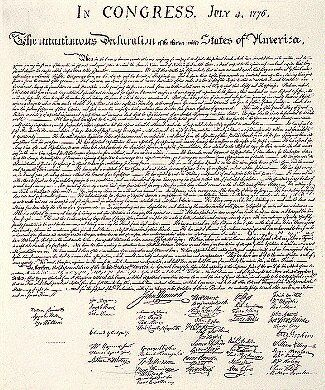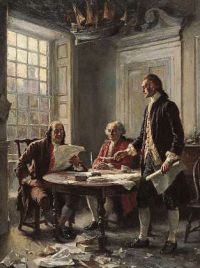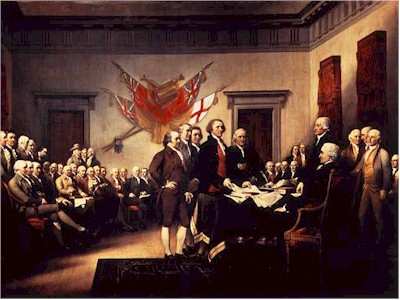LITR 5731 Seminar in American Multicultural Literature UHCL: Selections from the Declaration of
Independence of the United States of America
Purpose
for course:
The Declaration is first and foremost the political
document that founded the
new nation of the USA. But Jefferson was a gifted writer, so that the political
document is also a literary and cultural text.
·
In many respects, the Declaration is the “creation story” or “origin story”
for the United States, especially for the USA’s dominant culture of immigrants
and their descendents. It is thus comparable to other “creation / origin
stories” we’ll read this semester: slave narratives for African America,
many Native American origin stories, and the “Virgin of Guadalupe” for
Mexican America.
·
“Creation / Origin Stories” do not only tell of the beginning of a
world or system; they also declare, both explicitly and implicitly, the values
of the world being created. (For instance, the Judeo-Christian creation story in
Genesis models or endorses narratives and / or relationships between humanity
and God, humanity and nature, men and women, etc.)
·
As a “Creation / Origin Story,” what narratives or models of human
identity, behavior, or relation does the Declaration model?
·
What racial / ethnic or gender groups are excluded from consideration?
That is, when the Declaration says that “all men are created equal,” who is
and isn’t indicated by “men?” What are the requirements for being
“equal?”
The
Declaration of Independence of the Thirteen Colonies
In CONGRESS, July 4, 1776
The unanimous Declaration of the thirteen united States of America,
When in the Course of human events, it becomes necessary for one people to dissolve the political bands which have connected them with another, and to assume among the powers of the earth, the separate and equal station to which the Laws of Nature and of Nature's God entitle them, a decent respect to the opinions of mankind requires that they should declare the causes which impel them to the separation.
We hold these truths to be self-evident, that all men are created equal, that they are endowed by their Creator with certain unalienable Rights, that among these are Life, Liberty and the pursuit of Happiness. --That to secure these rights, Governments are instituted among Men, deriving their just powers from the consent of the governed, --That whenever any Form of Government becomes destructive of these ends, it is the Right of the People to alter or to abolish it, and to institute new Government, laying its foundation on such principles and organizing its powers in such form, as to them shall seem most likely to effect their Safety and Happiness.
Prudence, indeed, will dictate that Governments long established should not be changed for light and transient causes; and accordingly all experience hath shewn, that mankind are more disposed to suffer, while evils are sufferable, than to right themselves by abolishing the forms to which they are accustomed. But when a long train of abuses and usurpations, pursuing invariably the same Object evinces a design to reduce them under absolute Despotism, it is their right, it is their duty, to throw off such Government, and to provide new Guards for their future security. —Such has been the patient sufferance of these Colonies; and such is now the necessity which constrains them to alter their former Systems of Government. The history of the present King of Great Britain [George III] is a history of repeated injuries and usurpations, all having in direct object the establishment of an absolute Tyranny over these States. To prove this, let Facts be submitted to a candid world.
.
. . He has endeavoured to prevent the population of these States; for
that purpose obstructing the Laws for Naturalization of Foreigners; refusing to
pass others to encourage their migrations hither, and raising the conditions of
new Appropriations of Lands. .
. .
He has excited domestic insurrections amongst us, and has endeavoured to bring on the inhabitants of our frontiers, the merciless Indian Savages, whose known rule of warfare, is an undistinguished destruction of all ages, sexes and conditions. . . .
We, therefore, the Representatives of the united States of America, in General Congress, Assembled, appealing to the Supreme Judge of the world for the rectitude of our intentions, do, in the Name, and by the Authority of the good People of these Colonies, solemnly publish and declare, That these United Colonies are, and of Right ought to be Free and Independent States . . . . And for the support of this Declaration, with a firm reliance on the protection of divine Providence, we mutually pledge to each other our Lives, our Fortunes and our sacred Honor. . . .
Section drafted by Jefferson but omitted from final copy by committee:
He has waged cruel war against human nature itself, violating its most sacred rights of life and liberty in the persons of a distant people who never offended him, captivating and carrying them into slavery in another hemisphere, or to incur miserable death in their transportation hither. This piratical warfare, the opprobrium of infidel powers, is the warfare of the Christian king of Great Britain. (determined to keep open a market where MEN should be bought and sold,) he has prostituted his negative for suppressing every legislative attempt to prohibit or to restrain this execrable commerce (determining to keep open a market where MEN should be bought and sold): and that this assemblage of horrors might want no fact of distinguished die, he is now exciting those very people to rise in arms among us, and to purchase that liberty of which he had deprived them, by murdering the people upon whom he also obtruded them: thus paying off former crimes committed against the liberties of one people, with crimes which he urges them to commit against the lives of another.



Standard questions or challenges:
When the Declaration says that "All men are created equal," who counts as "men" and "equal?"
Modern answer: "Men" means "all people," as in "mankind."
Answer in 1776: "Men" meant white affluent men--"equal" was determined by race, class, and gender,
and so was inequality: non-whites, common people, and women.
Mitigating reply:
Jefferson didn't write "white affluent men" but "men"--language proved adaptable to future inclusions
> equality as ideal to be pursued rather than object already achieved
Class barriers fell first, in early 19th century with rise of Jacksonian democracy
Racial barriers began to fall in 1860s with American Civil War and 13th & 14th Amendments to U. S. Constitution
Women gained some citizens' rights in 19th century and right to vote in 1920 with 19th Amendment